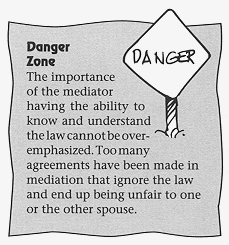|
|
|
|
|
|
|
that admits mediators based on training and accumulated experience, and if so, look there for a list of references. Your local Bar Association may be able to give you the names of reputable mediators. Word of mouth is a good way to locate an appropriate professional as well. |
|
|
|
|
|
|
|
|
The mediator should, at a minimum, have a degree in social work, counseling, or psychology. It is helpful, but not imperative, that the mediator have a law degree as well. Even without a law degree, though, the mediator should be completely familiar with the divorce laws of your state. |
|
|
|
|
|
|
|
|
How can you find out whether the mediator knows the law? Ask how long he has been doing mediation, how many cases he has handled, and how he keeps up with new developments in the law. Make sure that the mediator reads professional law journals for his newsnot just the local newspaper or Time magazine. The prospective mediator should be able to answer your questions without sounding defensive. |
|
|
|
|
|
|
|
|
Find out what and how the mediator charges before you hire one. |
|
|
|
|
|
|
|
|
Crass though it may sound, the mediator's fee should be discussed immediately, and you should all agree on how it is going to be paid. Will you each pay half the fee at the end of each session, or will one of you pay all of it and be reimbursed when the case is over and the assets are divided? Or will one of you foot the bill with no reimbursement? If the two of you cannot work that out with the mediator's help, reconsider whether mediation is for you. |
|
|
|
|
|
|
|
|
 |
|
|
|
|
|
|
|
|
Finally, do not forget to ask for referencesand call those references to check. The mediator may not be willing to give you the names of clients (and should not without the clients' prior consent), but the mediator should be able to give you the names of attorneys familiar with his or her work. After all, the mediator should be sending couples to attorneys to review any agreement before it is signed. If the mediator doesn't know any attorneys, or can't give you any names, interview someone else. Sometimes it is useful to engage in a dual mediation process where there are two mediators, one a lawyer and one a psychologist. Of course, this raises the cost. But in the right case, it may be worth it. |
|
|
|
|
|